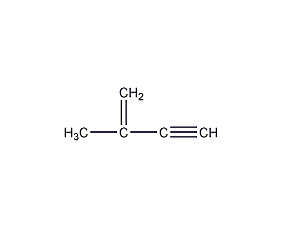
Structural formula
| Business number | 01NL |
|---|---|
| Molecular formula | C5H6 |
| Molecular weight | 66.10 |
| label |
isopropenyl acetylene, 2-Methyl-3-yne-1-butene, 2-Methyl-1-butenyne, 2-Methylbutenyne, Isopropenylacetylene, H2C=C(CH3)C≡CH |
Numbering system
CAS number:78-80-8
MDL number:MFCD00008599
EINECS number:201-144-9
RTECS number:EN0960000
BRN number:969175
PubChem number:24896828
Physical property data
1. Properties: Colorless liquid, tear-inducing
2. Density (g/mL, 25/4℃): 0.69
3. Relative vapor density (g /mL, air=1): 2.3
4. Melting point (ºC): -113℃
5. Boiling point (ºC, normal pressure): 33~34℃
6. Liquid phase standard hot melt (J·mol-1·K-1): 153.3
7. Refractive index: Uncertain
8. Flash point (ºC): -7℃/open cup
9. Specific rotation (º): Uncertain
10. Autoignition point or ignition temperature (ºC): Uncertain
11. Vapor pressure (kPa, 25ºC): Uncertain
12. Saturated vapor pressure (kPa, 60ºC): Uncertain Determine
13. Heat of combustion (KJ/mol): Uncertain
14. Critical temperature (ºC): Uncertain
15. Critical pressure (KPa ): Uncertain
16. Log value of oil-water (octanol/water) partition coefficient: Uncertain
17. Explosion upper limit (%, V/V): Uncertain
18. Lower explosion limit (%, V/V): Uncertain
19. Solubility: Slightly soluble in water, miscible in acetone, ethanol, benzene, tetrachloride carbon.
Toxicological data
1. Acute toxicity
Rat caliber LD50: 639mg/kg; mouse inhalation LC50: 12600mg/m3;
Mouse caliber LD50: 350mg/kg; mouse Abdominal LD50:>500mg/kg;
2. Neurotoxicity
Rabbit skin test: 500mg/24H;
Ecological data
None yet
Molecular structure data
1. Molar refractive index: 22.60
2. Molar volume (cm3/mol): 89.7
3. Isotonic specific volume (90.2K ): 195.2
4. Surface tension (dyne/cm): 22.4
5. Dielectric constant (F/m): 2.63
6. Polarizability (10-24cm3): 8.96
Compute chemical data
1. Reference value for hydrophobic parameter calculation (XlogP): 1.9
2. Number of hydrogen bond donors: 0
3. Number of hydrogen bond acceptors: 0
4. Number of rotatable chemical bonds: 1
5. Number of tautomers: none
6. Topological molecule polar surface area 0
7. Number of heavy atoms: 5
8. Surface charge: 0
9. Complexity: 79.5
10. Number of isotope atoms: 0
11. Determine the number of atomic stereocenters: 0
12. Uncertain number of atomic stereocenters: 0
13. Determine the number of chemical bond stereocenters: 0
14. Number of uncertain chemical bond stereocenters: 0
15. Number of covalent bond units: 1
Properties and stability
None yet
Storage method
This product should be sealed and stored in a cool, dark place.
Synthesis method
None yet
Purpose
Used as chemical intermediates, special fuels, and organic synthesis intermediates.

 微信扫一扫打赏
微信扫一扫打赏

